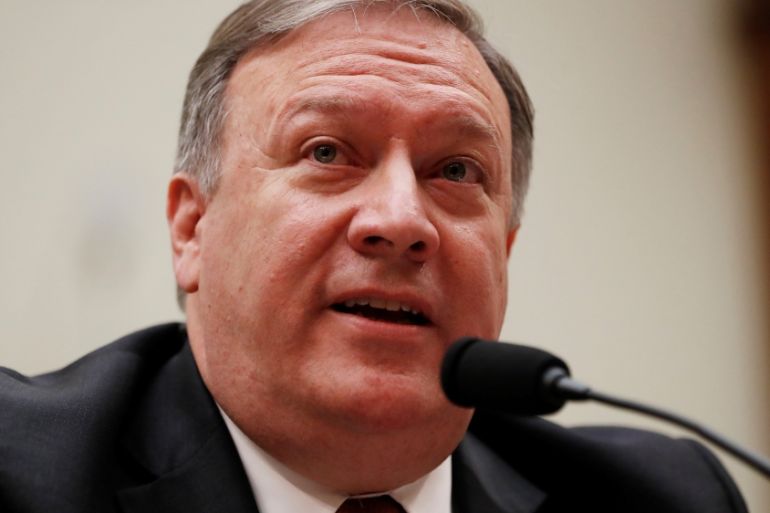Mike Pompeo: US diplomats ‘treated badly’ in Pakistan
The remarks from US secretary of state come as relations between the two erstwhile allies have continued to deteriorate.

Islamabad, Pakistan – Diplomats from the United States are being “treated badly” in Pakistan, Secretary of State Mike Pompeo has told a US congressional hearing, adding that the South Asian country would continue to receive diminishing US aid.
The remarks from Pompeo, who was testifying before the US House Committee on Foreign Affairs on Thursday, come as relations between the two erstwhile allies have continued to deteriorate.
“My officers, our state department officers, are being treated badly as well, folks working in the embassies and councils [and] in other places are not being treated well by the Pakistani government either,” Pompeo said, during a debate on the US Department of State’s budget for the 2019 fiscal year.
”My
in other places are not being treated well by the Pakistani government either”]
Earlier this month, the United States issued new restrictions for Pakistani diplomats posted in the country, requiring them to remain within a 25-mile (40.2km) radius of the city to which they are posted.
The Department of State said it was taking the measures on a reciprocal basis, as US diplomats posted in Pakistan face severe restrictions on their ability to travel within the country.
Pakistan says the restrictions are due to security concerns.
In a statement to Al Jazeera, a spokesperson for the US embassy in Pakistan, alleged that “the harassment faced by American and local US Embassy and Consulate personnel in Pakistan restricts their ability to carry out their mission.
“We have also documented numerous cases in which ordinary Pakistani citizens participating in our educational, cultural, and development programs have faced harassment by Pakistani government officials.”
Pakistan, however, said it has not received specific complaints from the US.
“Diplomats hailing from all countries enjoy diplomatic privileges alike and are provided every possible support as per international laws and norms as well as reciprocity,” said Muhammad Faisal, a spokesman for the Pakistani foreign ministry.
Aid cut
Earlier this year, the US cut roughly $1.1bn in security assistance to Pakistan, demanding that the country do more against armed groups – including the Afghan Taliban and Haqqani Network – that it claims are operating on Pakistani territory.
Pakistan has consistently denied that it allows its territory to be used by armed groups, saying a series of military operations undertaken since 2014 has targeted all groups indiscriminately.
Responding to a question, Pompeo said the US had released fewer funds in 2018 than they had the previously, and that the reduction in aid was likely to continue.
“The remainder of the funds available are under review. My guess is that that number will be smaller still,” he said.
The Department of State 2019 budget request includes roughly $331m in aid programmes for Pakistan.
The request includes $200m for economic support funds, $25m for narcotics control programmes, $22.5m for USAID-run health programmes and $3.5m in military training.
At least $80m of the aid, earmarked for foreign military assistance, is contingent on Pakistan taking further action against the Afghan Taliban and Haqqani Network, according to the budget request.
On Thursday, Pompeo also raised the issue of the continued detention in Pakistan of Dr Shakil Afridi, a Pakistani doctor who helped the CIA track down then al-Qaeda chief Osama bin Laden.
“Please be aware that it’s in my heart and I know it’s important and we can do that. We can achieve [his release],” he added.
Afridi has been in Pakistani custody since 2011, and was convicted the following year by a tribunal to 33 years in prison for aiding the Lashkar-e-Islam armed group, his lawyer, Qamar Nadeem, told Al Jazeera earlier this month.
Afridi has denied the charges and is in the process of appealing the verdict. His sentence was reduced to 23 years in 2014, his lawyer said.
Asad Hashim is Al Jazeera’s Digital Correspondent in Pakistan. He tweets @AsadHashim.